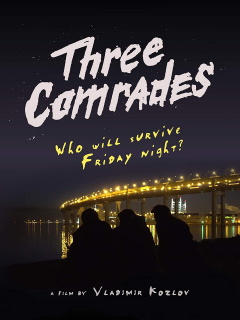

|
|
Three Comrades
R0 - America - Indiepix Review written by and copyright: Eric Cotenas (31st December 2020). |
|
The Film
 Gleb (Evgeniy Zarubin), Gosha (Ivan Shary), and Vlad (Andrei Yasinsky) work for a loan company, working out of a shared office over the telephone. Vlad is the most driven, entirely career-oriented, and uninterested in the hypotheticals of a too-the-camera introductory interview. Gosha is the most conventional, with long-range career goals and a fiancée. Gleb is the oldest of the three and seems settled in a job that he uses to sustain his nights out, slinking into work and shrugging into a dress shirt as he makes his first calls. While he admits that Russia's economy is not the way it was in the nineties, their Boiler Room-lite boss Popatov (Dmitriy Grishin) nevertheless accuses them of laziness and a lack of ambition when they cannot reach their sale targets (much less collect payments from the clients they have), and the guys cut out early after a non-productive Friday to blow off some steam before they have to be back early the next morning. After co-worker Olya (Olga Serikova) parts company with them at the bar after just two drinks, the three men go in search of entertainment – Gosha begging off an evening in with his girlfriend over the phone as the other two mock him – and end up stomping a teenage boy who takes umbrage at Gleb's loudly-voiced opinions about the band at a dance club, ridicule a derelict ex-military officer (Nikolay Sayapin) who tries to lecture them on the deteriorated state of the country in the international scene, frighten a migrant who tries to sell them a hot smartphone by pretending to be undercover cops (for a laugh), "rescue" a girl talking to a Muslim refugee, and berate a pair of attractive women who have the temerity to refuse their hospitality. Their pride wounded, Gleb decides that the best way to cap off the night would be for them to "fuck a girl." Things spiral out of control rapidly when it turn out that Gleb's friend (Ksenia Plyusnina) turns out to be not as game for the proposal as he had lead his friends to believe. The sixth feature of Belarus-born filmmaker Vladimir Kozlov, Three Comrades appears to carry on the themes of his earlier films (based on available synopses) which focus on Russian urban youth existing in a "moral vacuum." Despite the basic setup and the tagline "Who will survive Friday night?", this is not the Russian version of some douche-bro comedy like Very Bad Things. The plotting is slight and offers no surprises in terms of the depths of their depravity or their comeuppance. What makes Three Comrades interesting is the dynamic of the three characters, how little it takes for them to do something terrible, and how little they think of it; so certain are they of their superiority as straight white males. The opening interviews that introduce them at first suggest that the audience will be asked to compare them and determine which of them is the worst – the stern Vlad is mildly critical of Russian patriotism, the timid Gosha seems like a conformist lacking reflection, while Gleb at first appears to be the one who lacks convictions but is patriotic simply because such views support his feelings of superiority – but the contrasts between them seem less important than their similarities in an observation of "toxic masculinity" (and it is indeed that when Gleb goes on a rant about #MeToo as an "affront to human and women's dignity"). The cynical capper to the abrupt climax may not be entirely dramatically satisfying but it does seem to be the only way that the film could end with such characters.
Video
Photographed digitally in an unaffected guerilla-style that favors coverage over stylish imagery, Indiepix's 16:9 anamorphic 1.78:1 widescreen encode of Three Comrades probably looks as good as the rough-and-ready looking film can thanks to a relatively high-bitrate for a short film on a single-layer DVD-R disc, coming in at just under 4GB (although that is video plus uncompressed LPCM stereo audio).
Audio
The LPCM 2.0 Russian stereo audio track boasts clear dialogue and a soundscape made up entirely of location sounds, with some added rock music underscore for a couple walking and talking sequences lacking clarity (although this may be by design to underline the stylistic monotony of such sequences in disaffected youth films). The English subtitles are encoded into the video and are free of any obvious errors.
Extras
The sole extra is a trailer (1:31) for the film.
Overall
|
|||||

|